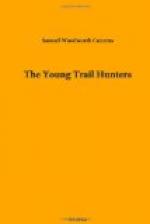The Indian, who appeared to comprehend these signs perfectly, answered by making a graceful, undulating motion with his right hand, not unlike the wriggling movement made by a snake in crawling. Then he elevated both hands high above his head, clasped closely together; then, apparantly satisfied with this pantomime, he started at a rapid pace toward us. Jerry turned; and, seeing my looks of astonishment, hurriedly said,—
“That ere’s the lingo of the plains. Every Injun understands that. I told the feller to stop and explain who he was. He answered that he was a Comanche, and friendly. Mebbe we can git some news of the boys from him, though we shan’t ef he ain’t a mind to tell, for Injuns is mighty clus-mouthed critters.”
At this moment the Comanche rode up. Bringing his horse abruptly to a stand-still, he extended a very dirty hand, ornamented with finger-nails that closely resembled the talons of an eagle.
“Me Senaco, good Injun,” he exclaimed, in pretty fair Spanish.
“Of course you be,” replied Jerry, in English. “Whoever seed a bad Injun, ef you let him tell his story?
“We’ve got to pretend to believe the lyin’ varmint or we shan’t find out nothin’ from him, that’s sartin.”
As this was the first opportunity I ever had of examining a live Comanche, I regarded this specimen with some curiosity; for a friendly Comanche in those days was indeed an anomaly.
The Indian’s body was entirely naked, with the exception of a breech-cloth and pair of leggins. The leggins extended from the knee, down; and, with his moccasins, were made of buckskin, heavily fringed and ornamented.
A large red blanket covered his left shoulder, fastened beneath his right arm in such a manner as to leave the arm free and unobstructed, and then hung loosely behind him, almost touching the ground as he sat upon his horse. The animal was a rough looking little pony, that bore evidence of being both tough and fleet.
The fellow’s face was deeply marked by the small-pox, and hideously painted with vermilion and ochre; while, from his ears, were suspended, heavy rings of brass wire. These, with the paint, gave him a most diabolical expression, that was in no manner relieved by the shaggy locks of unkempt black hair that hung around his head.
His only weapon was a long, murderous-looking, iron-headed spear, which, with his lariat, he held in his right hand.
We made several efforts to find out what the fellow’s object in hailing us was, before he condescended to give it. Then he said that he had that mornin met with a party of Comanches, who had with them two prisoners,— mere boys. He was angry that braves should capture such children, for only squaws, not warriors, made prisoners of boys.
After much talk, he had made the Indians ashamed of the act, and they were willing to release the captives for a small ransom. He was a friend, and begged us to remember, was acting as an embassador, in search of the party to which the children belonged.




